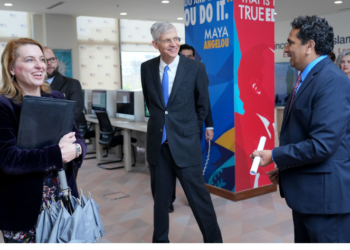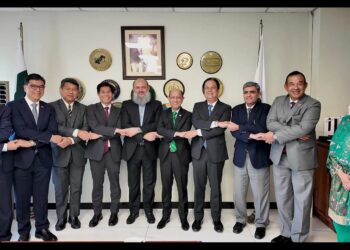ISLAMABAD : 14th Pakistan-European Union (EU) Joint Commission took place on November 21, 2024, in Islamabad. The meeting reviewed recent political developments, including Pakistan’s upcoming parliamentary elections on February 8, 2024, and the EU’s elections to the European Parliament (June 6-9, 2024), as well as the ongoing formation of the new European Commission.
Both Pakistan and the EU underscored the importance of their cooperation, particularly in trade, migration, human rights, and political, economic, and development areas, with an emphasis on the Global Gateway strategy. They also committed to addressing emerging challenges like food and energy security and climate change.
Preceding the Joint Commission, the Sub-Group on Democracy, Governance, Rule of Law, and Human Rights met on November 19, 2024, co-chaired by Pakistan’s Ministry of Foreign Affairs and the European External Action Service. Both parties discussed political developments post-elections in Pakistan and the EU, agreeing on the need to strengthen the electoral process. The EU emphasized the importance of political pluralism, independent media, judicial independence, and international human rights standards.
Both sides reaffirmed their commitment to human rights, including the protection of women, children, labor, and migrant rights, as well as freedoms like expression, and the challenge of disinformation. Pakistan shared its reform agenda, including the National Action Plan on Human Rights and the full implementation of 27 international conventions related to GSP+. Discussions also covered freedom of religion, the rights of minorities, and anti-Muslim hatred. The EU reiterated its stance on abolishing the death penalty and urged reforms in the mercy petition process.
On November 20, 2024, a meeting of the Sub-Group on Trade was held between Pakistan’s Ministry of Commerce and the European Commission’s DG Trade. The EU remains Pakistan’s second-largest trading partner, and the GSP+ arrangement has significantly boosted bilateral trade. Both sides discussed market access challenges, with particular attention to GSP+ implementation. They agreed to continued cooperation, ensuring that upcoming legislative changes are communicated to help Pakistan comply with the EU regulatory framework.
On November 20, 2024, another meeting took place between Pakistan’s Ministry of Economic Affairs and the European Commission’s International Partnerships DG. Both sides reaffirmed key priorities under the Multi-Annual Indicative Programme (MIP), including Green Inclusive Growth, Human Capital/TVET, and Governance, which align with Pakistan’s development agenda. Pakistan welcomed the EU’s continued support for its Resilient Recovery, Rehabilitation, and Reconstruction Framework (4RF), and expressed interest in enhancing engagement within the Global Gateway framework for new investments.
The EU also reiterated its support for Pakistan in developing green energy and discussed regional programs aimed at strengthening collaboration in common areas. Civil society’s role in socio-economic development and the enabling environment for investments under the Global Gateway were key points of discussion.
Reaffirming their commitment to the 2019 Pakistan-EU Strategic Engagement Plan (SEP), both sides reviewed its progress and discussed expanding cooperation in agriculture, taxation, and disaster risk reduction. They also reviewed the Pakistan-EU Migration and Mobility Dialogue, focusing on return and readmission under the Joint Readmission Agreement and legal migration under the Talent Partnership.
The EU praised Pakistan’s hosting of Afghan refugees and welcomed the extension of Proof of Registration cards for Afghan nationals until June 30, 2025. Both parties committed to supporting the Solution Strategy for Afghan Refugees (SSAR) to provide lasting solutions for refugees and host communities.
Regarding regional security, the EU and Pakistan emphasized cooperation on counter-terrorism and counter-narcotics. Pakistan raised concerns over human rights in Jammu and Kashmir and called for an immediate ceasefire in Gaza, while the EU called for humanitarian access and a peaceful resolution of conflicts, respecting international law.
The Joint Commission was co-chaired by Dr. Kazim Niaz, Secretary of Pakistan’s Ministry of Economic Affairs, and Ms. Paola Pampaloni, Deputy Managing Director for Asia and the Pacific in the European External Action Service. The next session will be held in Brussels in 2025.
Ends














